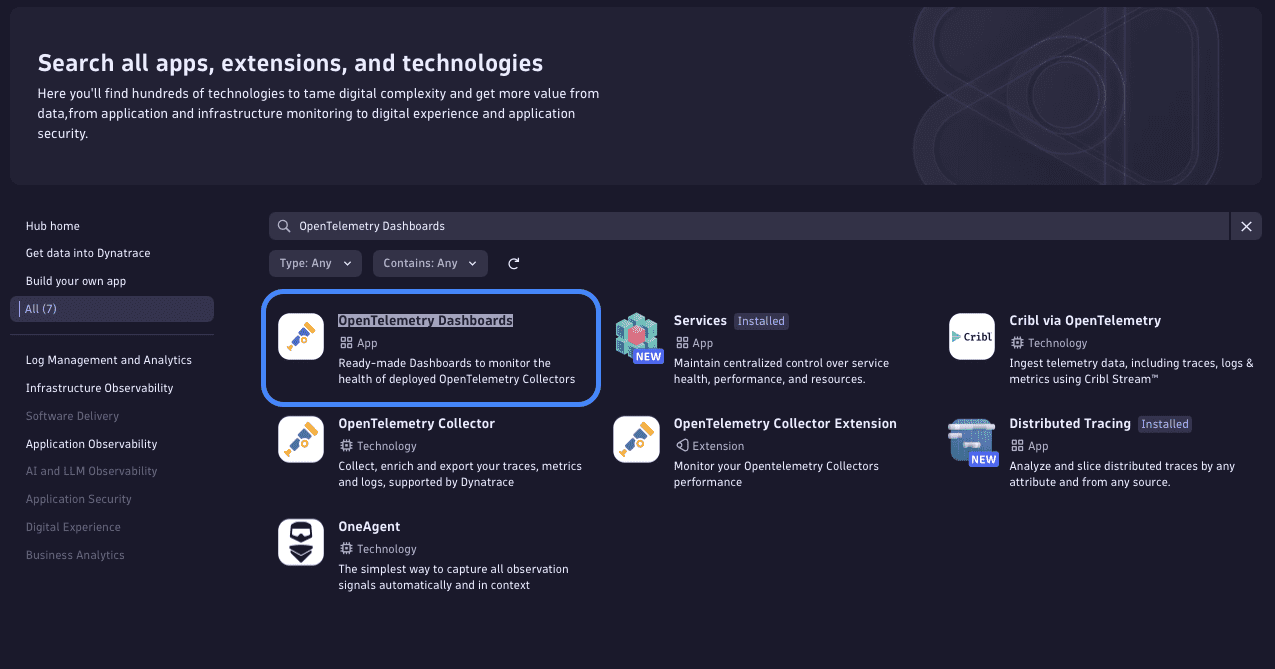Monitor Kubernetes clusters with the OpenTelemetry Collector
- Latest Dynatrace
- How-to guide
- 5-min read
The OpenTelemetry Collector provides extensive support for Kubernetes cluster and workload monitoring. It supports various receivers to collect critical metrics about the Kubernetes cluster, nodes, and objects.
This use case explains how to set up your OpenTelemetry Collector to get full visibility into your Kubernetes clusters through ready-made dashboards provided by  Dashboards.
Dashboards.
Dynatrace recommends using the Dynatrace Operator for Kubernetes monitoring. However, this use case is designed specifically for OpenTelemetry users who choose not to deploy the Dynatrace Operator. It leverages pure OpenTelemetry data, which is not integrated into the Dynatrace Kubernetes application. Despite this, it provides ready-made Kubernetes dashboards and enables users to create custom dashboards and notebooks using the collected telemetry data.
Prerequisites
- One of the following Collector distributions with the Kubernetes Cluster, Kubernetes Events, and Kubelet Stats receivers:
- Collector deployment in agent mode for node and cluster level telemetry
- The API URL of your Dynatrace environment
- An API token with the relevant access scope
- Kubernetes configured for the required role-based access control
See Collector Deployment and Collector Configuration on how to set these up with the configurations provided below.
Demo configurations
RBAC configuration
Configure the following rbac.yaml file with your Kubernetes instance, to allow the Collector to use the Kubernetes API with the service-account authentication type.
apiVersion: v1kind: ServiceAccountmetadata:labels:app: otelcol-dtname: otelcol-dt---apiVersion: rbac.authorization.k8s.io/v1kind: ClusterRolemetadata:name: otelcol-dtlabels:app: otelcol-dtrules:- apiGroups:- ""resources:- events- namespaces- namespaces/status- nodes- nodes/spec- nodes/stats- nodes/proxy- persistentvolumes- persistentvolumeclaims- pods- pods/status- replicationcontrollers- replicationcontrollers/status- resourcequotas- servicesverbs:- get- list- watch- apiGroups:- appsresources:- daemonsets- deployments- replicasets- statefulsetsverbs:- get- list- watch- apiGroups:- batchresources:- jobs- cronjobsverbs:- get- list- watch- apiGroups:- autoscalingresources:- horizontalpodautoscalersverbs:- get- list- watch- apiGroups:- coordination.k8s.ioresources:- leasesverbs:- get- list- watch- create- update- patch- delete---apiVersion: rbac.authorization.k8s.io/v1kind: ClusterRoleBindingmetadata:name: otelcol-dtlabels:app: otelcol-dtroleRef:apiGroup: rbac.authorization.k8s.iokind: ClusterRolename: otelcol-dtsubjects:- kind: ServiceAccountname: otelcol-dtnamespace: default
Collector configuration
extensions:health_check:endpoint: 0.0.0.0:13133k8s_leader_elector:auth_type: "serviceAccount"lease_name: k8smonitoringlease_namespace: ${env:POD_NAMESPACE}receivers:otlp:protocols:grpc:endpoint: 0.0.0.0:4317k8s_events:auth_type: "serviceAccount"k8s_leader_elector: k8s_leader_electorkubeletstats:auth_type: "serviceAccount"collection_interval: 10snode: '${env:K8S_NODE_NAME}'extra_metadata_labels:- k8s.volume.typek8s_api_config:auth_type: "serviceAccount"endpoint: "https://${env:K8S_NODE_NAME}:10250"insecure_skip_verify: truemetric_groups:- node- pod- container- volumek8s_cluster:auth_type: "serviceAccount"collection_interval: 10sk8s_leader_elector: k8s_leader_electorallocatable_types_to_report:- cpu- memory- podsnode_conditions_to_report:- Ready- MemoryPressure- PIDPressure- DiskPressure- NetworkUnavailablemetrics:k8s.node.condition:enabled: truek8s.pod.status_reason:enabled: trueprocessors:cumulativetodelta:max_staleness: 25hfilter:error_mode: ignoremetrics:metric:- 'IsMatch(name, "k8s.volume.*") and resource.attributes["k8s.volume.type"] == nil'- 'resource.attributes["k8s.volume.type"] == "configMap"'- 'resource.attributes["k8s.volume.type"] == "emptyDir"'- 'resource.attributes["k8s.volume.type"] == "secret"'transform:error_mode: ignoretrace_statements: &dynatrace_transformations# Set attributes taken from k8s metadata.- context: resourcestatements:- set(attributes["k8s.cluster.name"], "${env:CLUSTER_NAME}")- set(attributes["k8s.workload.kind"], "job") where IsString(attributes["k8s.job.name"])- set(attributes["k8s.workload.name"], attributes["k8s.job.name"]) where IsString(attributes["k8s.job.name"])- set(attributes["k8s.workload.kind"], "cronjob") where IsString(attributes["k8s.cronjob.name"])- set(attributes["k8s.workload.name"], attributes["k8s.cronjob.name"]) where IsString(attributes["k8s.cronjob.name"])- set(attributes["k8s.workload.kind"], "daemonset") where IsString(attributes["k8s.daemonset.name"])- set(attributes["k8s.workload.name"], attributes["k8s.daemonset.name"]) where IsString(attributes["k8s.daemonset.name"])- set(attributes["k8s.workload.kind"], "statefulset") where IsString(attributes["k8s.statefulset.name"])- set(attributes["k8s.workload.name"], attributes["k8s.statefulset.name"]) where IsString(attributes["k8s.statefulset.name"])- set(attributes["k8s.workload.kind"], "replicaset") where IsString(attributes["k8s.replicaset.name"])- set(attributes["k8s.workload.name"], attributes["k8s.replicaset.name"]) where IsString(attributes["k8s.replicaset.name"])- set(attributes["k8s.workload.kind"], "deployment") where IsString(attributes["k8s.deployment.name"])- set(attributes["k8s.workload.name"], attributes["k8s.deployment.name"]) where IsString(attributes["k8s.deployment.name"])# remove the delete statements if you want to preserve these attributes- delete_key(attributes, "k8s.deployment.name")- delete_key(attributes, "k8s.replicaset.name")- delete_key(attributes, "k8s.statefulset.name")- delete_key(attributes, "k8s.daemonset.name")- delete_key(attributes, "k8s.cronjob.name")- delete_key(attributes, "k8s.job.name")# Set attributes from metadata specified in Dynatrace and set through the Dynatrace Operator.# For more info: https://docs.dynatrace.com/docs/shortlink/k8s-metadata-telemetry-enrichment- context: resourcestatements:- merge_maps(attributes, ParseJSON(attributes["metadata.dynatrace.com"]), "upsert") where IsMatch(attributes["metadata.dynatrace.com"], "^\\{")- delete_key(attributes, "metadata.dynatrace.com")metric_statements: *dynatrace_transformationslog_statements: *dynatrace_transformationsk8sattributes:extract:metadata:- k8s.pod.name- k8s.pod.uid- k8s.pod.ip- k8s.deployment.name- k8s.replicaset.name- k8s.statefulset.name- k8s.daemonset.name- k8s.job.name- k8s.cronjob.name- k8s.namespace.name- k8s.node.name- k8s.cluster.uid- k8s.container.nameannotations:- from: podkey_regex: metadata.dynatrace.com/(.*)tag_name: $$1- from: podkey: metadata.dynatrace.comtag_name: metadata.dynatrace.compod_association:- sources:- from: resource_attributename: k8s.pod.name- from: resource_attributename: k8s.namespace.name- sources:- from: resource_attributename: k8s.pod.ip- sources:- from: resource_attributename: k8s.pod.uid- sources:- from: connectionexporters:otlp_http:endpoint: ${env:DT_ENDPOINT}headers:Authorization: "Api-Token ${env:DT_API_TOKEN}"service:extensions:- health_check- k8s_leader_electorpipelines:metrics/node:receivers:- kubeletstatsprocessors:- filter- k8sattributes- transform- cumulativetodeltaexporters:- otlp_httpmetrics:receivers:- k8s_clusterprocessors:- k8sattributes- transform- cumulativetodeltaexporters:- otlp_httplogs:receivers:- k8s_eventsprocessors:- transformexporters:- otlp_httptraces:receivers:- otlpprocessors:- k8sattributes- transformexporters:- otlp_http
Validate your settings to avoid any configuration issues.
It is recommended to set the max_staleness parameter of the cumulativetodelta processor to a value higher than how often the collector receives metrics (e.g., how often metrics via OTLP are received, or how long the Prometheus scrape interval is). This ensures that no references to abandoned metric streams accumulate in memory over time.
Components
For our configuration, we configured the following components:
Receivers
Under receivers, we specify the following receivers as active receiver components for our deployment:
otlp: To accept OTLP traces.k8sevents: To receive Kubernetes events from the Kubernetes API server.k8s_cluster: To receive cluster-level metrics and entity events from the Kubernetes API server.kubeletstats: To receive node-level metrics. This receiver requires the environment variableK8S_NODE_NAMEto be set tospec.nodeNameusing the Kubernetes Downward API (see example).
(*) The k8seventsreceiver is currently in alpha stage and may undergo significant changes. Despite its early stage of maturity, it has been included in the Dynatrace distribution of the OpenTelemetry Collector to support early adoption and experimentation. Be aware that stability, performance, and feature completeness are not guaranteed at this stage.
Processors
Under processors, we specify the following processors:
-
filter: To filter Kubernetes attributes. -
k8sattributes: To extract and provide pod data. -
transform: To transform Kubernetes metrics. This requires the environment variableCLUSTER_NAMEto be set with the name of the cluster. Set the variable value to an arbitrary name that you want your cluster to show up with inside Dynatrace. -
cumulativetodelta: To enable conversion of cumulative metrics.
Exporters
Under exporters, we specify the otlp_http exporter and configure it with our Dynatrace API URL and the required authentication token.
For this purpose, we set the following two environment variables and reference them in the configuration values for endpoint and Authorization.
DT_ENDPOINTcontains the base URL of the Dynatrace API endpoint (for example,https://{your-environment-id}.live.dynatrace.com/api/v2/otlp)DT_API_TOKENcontains the API token
Extensions
Under extensions, we specify the k8sleaderelector extension to choose the leader of the agent replicas, which is going to scrape and export cluster-level telemetry.
This ensures that only one collector instance scrapes the data at a time to avoid telemetry duplication.
Service pipelines
Under service, we assemble our receiver, processor, and exporter objects into pipelines for traces, metrics, and logs. These pipelines allow us to send OpenTelemetry signals via the Collector instance and have them automatically enriched with additional Kubernetes-specific details.
Install and access ready-made dashboards
Install dashboards
To make these dashboards available in your tenant, install the OpenTelemetry Dashboards app via the Dynatrace Hub.

Access dashboards
For how to find and use ready-made dashboards, see Ready-made dashboards.
When accessing the dashboards, you have the following choices:
- OpenTelemetry K8s Cluster: A comprehensive overview of cluster performance, including nodes, pods, containers, events, and more.
- OpenTelemetry K8s Node - Pods: Visualizes pod-level resource consumption across Kubernetes nodes.
- OpenTelemetry K8s Namespace - Pods: Analyzes resource usage of all pods within a specific namespace.
- OpenTelemetry K8s Namespace - Workloads: Focuses on resource allocation and performance of workloads within a namespace.
- OpenTelemetry K8s Persistent Volumes: Monitors usage and capacity of persistent volume claims.

Limits and limitations
Data is ingested using the OpenTelemetry protocol (OTLP) via the Dynatrace OTLP APIs and is subject to the API's limits and restrictions. For more information see: